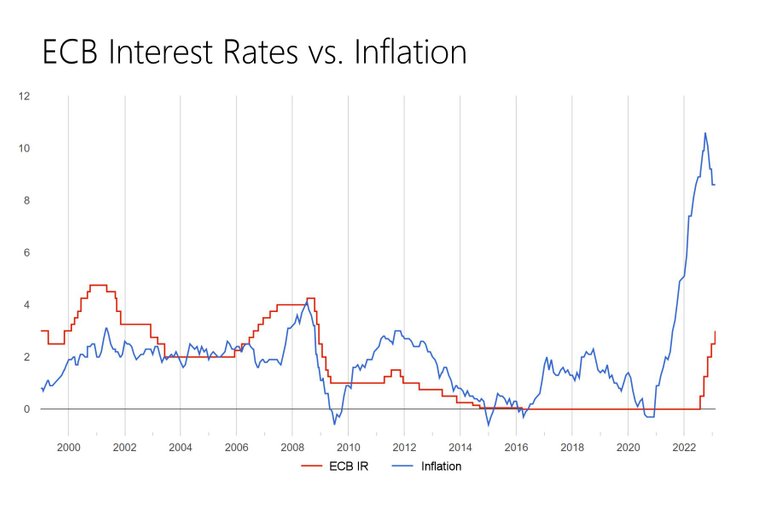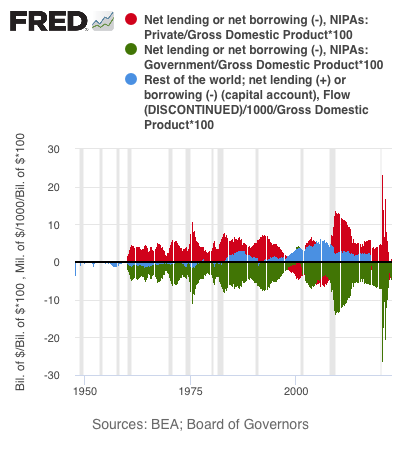EZB Leitzinsen vs. Inflation: Die wahre Ursache für die Inflation
Die EZB hat fast ein Jahrzehnt die Zinsen nicht angehoben und mit der umstrittenen Nullzinsen- und QE-Politik für reale Negativ-Zinsen gesorgt. Ein Paradies für Schuldner und Pleite-Staaten, sich weiter zu verschulden, ohne negative Konsequenzen auf den Kapitalmärkten zu erwarten.
Zusätzlich Anleihenkäufe im großen Stil und negative Einlagenzinsen. Wenn Banken Geld bei der EZB hinterlegt haben, mussten sie sogar negative Zinsen zahlen. Eigentlich total verrückt das Ganze.
In der Anfangszeit des Euros hat die EZB die Leitzinsen noch häufig und rasch angepasst und das Niveau über der Preis-Inflation gehalten. Anfang der 2010-Jahre hat die EZB dann aufgehört Zinsen anzuheben und ist in den umstrittenen Nullzins-Modus gewechselt, obwohl die Inflation nicht weg war. Sie hat sich nur Richtung Assets verlagert.
Dann kamen Lockdowns und der Ukraine-Krieg, steigende Energiepreise, Mega-Subventionen, Airdrops. Alles mit Schulden finanziert.
Ich würde sagen die Energiepreise und Lockdowns waren eher der Auslöser der jetztigen Inflationskrise. Es gibt wie immer eine Vorgeschichte. Schulden wurden von den Staaten exzessiv aufgeblasen. Und die EZB hat dabei kräftig mitgeholfen.
Was sagt ihr dazu? Wird die hohe Inflation noch länger anhalten? Vielleicht sogar Jahre?
ECB Key Interest Rates vs. Inflation (Euro Area)

https://staatsschulden.at/leitzinsen
English
The ECB has not raised interest rates for almost a decade and has caused real negative interest rates with its controversial zero interest rate and QE policies. A paradise for debtors and bankrupt states to borrow further without expecting negative consequences on the capital markets.
In addition, bond purchases on a grand scale (QE) and negative deposit rates. When banks deposited money with the ECB, they even had to pay negative interest rates. Actually, the whole thing is totally crazy.
In the early days of the euro, the ECB still adjusted key interest rates frequently and quickly and kept the level above price inflation most of the time. Then in the early 2010s, the ECB stopped raising rates and went into the controversial zero interest rate mode, even though inflation hadn't gone away. It just shifted toward assets.
Then came lockdowns and the Ukraine war, rising energy prices, big subsidies, airdrops. All financed with debt.
I would say the energy prices and lockdowns were more the trigger of the current inflation crisis but not the real cause. As always, there is a back story. For a long time governments inflated their debt excessively. And the ECB has helped member states to do that.
What do you guys think? Will the high inflation crisis in Europe continue for much longer? Probably years?
Live your Secrets and Hive Prosper 🍯
xx Viki @vikisecrets






